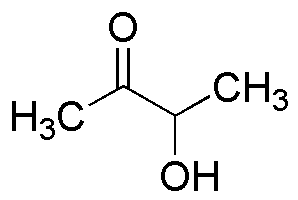Acetoin is widely utilized in research focused on:
- Food and Beverage Industry: Acetoin is commonly used as a flavoring agent in various food products, providing a buttery aroma and taste that enhances the sensory experience of consumers.
- Fragrance Industry: This compound serves as a key ingredient in perfumes and cosmetics, imparting a pleasant scent and improving the overall fragrance profile of personal care products.
- Pharmaceuticals: Acetoin is explored for its potential therapeutic properties, including its role as a precursor in the synthesis of certain medications, thus aiding in drug development.
- Biotechnology: In microbial fermentation processes, acetoin is produced by various bacteria and is studied for its applications in biofuel production, showcasing its importance in sustainable energy solutions.
- Research and Development: Acetoin is used in laboratories for various chemical reactions and studies, particularly in organic chemistry, due to its reactivity and versatility as a building block in synthetic pathways.
General Information
Properties
Safety and Regulations
Applications
Acetoin is widely utilized in research focused on:
- Food and Beverage Industry: Acetoin is commonly used as a flavoring agent in various food products, providing a buttery aroma and taste that enhances the sensory experience of consumers.
- Fragrance Industry: This compound serves as a key ingredient in perfumes and cosmetics, imparting a pleasant scent and improving the overall fragrance profile of personal care products.
- Pharmaceuticals: Acetoin is explored for its potential therapeutic properties, including its role as a precursor in the synthesis of certain medications, thus aiding in drug development.
- Biotechnology: In microbial fermentation processes, acetoin is produced by various bacteria and is studied for its applications in biofuel production, showcasing its importance in sustainable energy solutions.
- Research and Development: Acetoin is used in laboratories for various chemical reactions and studies, particularly in organic chemistry, due to its reactivity and versatility as a building block in synthetic pathways.
Documents
Safety Data Sheets (SDS)
The SDS provides comprehensive safety information on handling, storage, and disposal of the product.
Product Specification (PS)
The PS provides a comprehensive breakdown of the product’s properties, including chemical composition, physical state, purity, and storage requirements. It also details acceptable quality ranges and the product's intended applications.
Certificates of Analysis (COA)
Search for Certificates of Analysis (COA) by entering the products Lot Number. Lot and Batch Numbers can be found on a product’s label following the words ‘Lot’ or ‘Batch’.
*Catalog Number
*Lot Number
Certificates Of Origin (COO)
This COO confirms the country where the product was manufactured, and also details the materials and components used in it and whether it is derived from natural, synthetic, or other specific sources. This certificate may be required for customs, trade, and regulatory compliance.
*Catalog Number
*Lot Number
Safety Data Sheets (SDS)
The SDS provides comprehensive safety information on handling, storage, and disposal of the product.
DownloadProduct Specification (PS)
The PS provides a comprehensive breakdown of the product’s properties, including chemical composition, physical state, purity, and storage requirements. It also details acceptable quality ranges and the product's intended applications.
DownloadCertificates of Analysis (COA)
Search for Certificates of Analysis (COA) by entering the products Lot Number. Lot and Batch Numbers can be found on a product’s label following the words ‘Lot’ or ‘Batch’.
*Catalog Number
*Lot Number
Certificates Of Origin (COO)
This COO confirms the country where the product was manufactured, and also details the materials and components used in it and whether it is derived from natural, synthetic, or other specific sources. This certificate may be required for customs, trade, and regulatory compliance.


